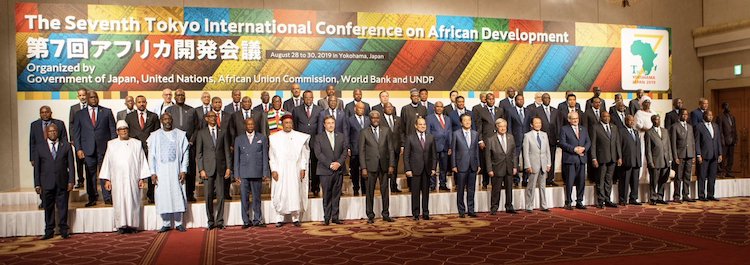
By Taro Ichikawa
YOKOHAMA (IDN) – “I see Africa as a dynamic continent of opportunity where winds of hope are blowing ever stronger. TICAD has played a critical role in focusing international dialogue on Africa, built on the twin principles of African ownership and international partnership,” said UN Secretary-General António Guterres kicking off the 7th Tokyo International Conference on African Development (TICAD 7). The United Nations, UN Development Programme (UNDP), World Bank and the African Union Commission (AUC) co-hosted the conference in Yokohama city.
TICAD is an initiative of the Government of Japan. The first conference took place in 1993. This year’s focused on “advancing Africa’s Development through People, Technology and Innovation”.
TICAD partnerships have made important contributions to Africa’s economic transformation through entrepreneurship and trade. They have supported increased access to health services, education, water and sanitation, and helped promote peace and stability, noted Guterres, and added that implementation of the Yokohama Declaration is “a vital way of scaling up partnerships for peace and sustainable development in line with those two agendas”.
The Yokohama Declaration of August 30 reiterates the need for advancing the continent’s “development through people, technology and innovation” and stressed the importance of the three pillars of the conference. WATCH
The three pillars of TICAD 7 are: i) accelerating economic transformation and improving business environment through innovation and private sector engagement; ii) deepening sustainable and resilient society; and iii) strengthening peace and stability. For each of these pillars, the Yokohama Declaration commends achievements, highlights outstanding issues, and promotes continued collaboration and actions to advance progress.
The Declaration supports ongoing efforts to strengthen the humanitarian-development-peace-security nexus including the operationalization of the African Humanitarian Agency. Furthermore, it commits support to the African Union Agenda 2063 and its Flagship Programmes and Projects, including the Initiative on Silencing the Guns in Africa by 2020, recognizing that peace and development are inextricably linked.
“Despite the foregoing progress, we recognize that Africa is confronted by global challenges that could hamper and erode the progress that has been made,” says the Declaration. Climate change, loss of biodiversity, irregular migration, disease outbreaks, and natural disasters know no borders as exemplified by cyclones Idai and Kenneth that devastated parts of Southern and Eastern Africa in 2019, it adds.
The Declaration welcomes the African Space Agency intended to promote science, technology and innovation (STI) for Africa’s sustainable development. At the same time, it recognize the importance of fighting against poverty and inequality and to promote social inclusion and cohesion, leaving no one behind.
“Enhancing governance, combatting transnational organized crime, illicit financial flows and corruption, promoting peace-building, and countering illegal wildlife trade, terrorism and violent extremism are also issues of global priority,” the Declaration states and adds: “We commit to working individually and collectively to addressing these issues as urgent challenges.”
 Photo: UN Secretary-General António Guterres addressing TICAD7. Credit: @UN Spokesperson
Photo: UN Secretary-General António Guterres addressing TICAD7. Credit: @UN Spokesperson
Among other attributes, Africa has large untapped sources of renewable energy, arable land, and natural resources that could be used to propel socioeconomic transformation, notes the Yokohama Declaration.
Africa is the most youthful continent, with a population of over one billion people and a middle class of 300 million that is growing as incomes rise. Agriculture and agribusiness are expected to be a USD 1 trillion industry by 2030, with urbanization and changing food patterns creating new economic opportunities.
Besides, some African Union Member States are also among the fastest growing economies and the top performers in terms of improving the business climate. “With an improving business and regulatory environment, Africa offers significant investment opportunities to domestic and foreign investors for economic diversification in transformative sectors such as agriculture, industry, infrastructure, energy and ICT,” says the Declaration.
The continent is an attractive destination for investors and serves as a huge source of consumer markets for locally and internationally produced food, goods and services. With this in view, the Declaration commits to promoting advocacy platforms to attain greater visibility for the 2018 African Continental Free Trade Agreement (AfCFTA) internationally and for the private sector and other stakeholders in Africa and Japan to enhance the implementation of the agreement.
The Yokohama Declaration stresses high priority to multilateralism and international legitimacy, reiterates that “the reform of the Security Council should be addressed in a comprehensive, transparent and balanced manner”.
The reform, it states, should address all the five key issues including the question of the veto, “and should garner the widest possible political acceptance by Member States through the intergovernmental negotiations that are fully owned and led by Member States, as stipulated in the UN General Assembly Decision 62/557”.
“We acknowledge the historical injustice against Africa with regard to its representation in the Security Council, and express support for full African representation in the Security Council, through not less than two Permanent seats with all the prerogatives and privileges of Permanent membership including the right of veto, and five Non-permanent seats, in line with the African Common Position as enshrined in Ezulwini Consensus and Sirte Declaration,” the Yokohama Declaration spells out. [IDN-InDepthNews – 01 September 2019]
Photo credit: twitter.com/antonioguterres
IDN is flagship agency of the International Press Syndicate.
facebook.com/IDN.GoingDeeper – twitter.com/InDepthNews











